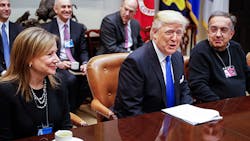Trump Tells Ford, FCA, GM That Environmental Regulations Will Ease
President Donald Trump told chief executives of the three biggest U.S. automakers that environmental regulations are "out of control" and promised he would remove obstacles for manufacturers and oil companies.
Leaders of Ford Motor Co., Fiat Chrysler Automobiles NV and General Motors Co. met Trump at the White House, the most recent in a series of meetings this week aimed at bolstering the U.S. manufacturing sector. The president reiterated his desire to reduce regulations, which may indicate a willingness to scale back federal fuel-economy demands.
“I am, to a large extent, an environmentalist,” Trump told the auto executives. “I believe in it. But it’s out of control.”
Trump’s meeting with Ford CEO Mark Fields, GM CEO Mary Barra and Fiat Chrysler CEO Sergio Marchionne occurred a day after he signed a memorandum withdrawing the U.S. from the Trans-Pacific Partnership trade agreement, claiming the pact would hurt workers. He has pledged to renegotiate the North American Free Trade Agreement with Mexico and Canada.
Fields, who also met with Trump on Monday as part of a group of manufacturing executives, returned to the White House on Tuesday for the meeting with automakers.
“We have a very big push on to have auto plants, and other plants,” Trump told the auto executives. “We’re going to make the process much more simple for the oil companies and everybody else that wants to do business in the United States.”
The meeting presents Detroit’s automakers with a key opportunity to weigh in on major issues the administration plans to tackle in its earliest days, including trade, regulatory and tax reforms. Fields planned to discuss corporate tax reform, the need for “data-driven regulations” and trade policy initiatives that address foreign currency manipulation, Ford spokeswoman Christin Baker said.
All three automakers have given Trump fodder for promoting his efforts to boost U.S. hiring. Ford canceled a $1.6 billion car assembly plant in Mexico and has said it will spend $700 million to expand a Michigan factory instead. GM and Fiat Chrysler have each pledged $1 billion in investment toward domestic assembly, though both companies have said their plans were made prior to Trump winning the election.
All three also continue to produce vehicles in Mexico. Ford will assemble Focus compacts at an existing factory in Hermosillo already building Fusion and Lincoln MKZ sedans.
GM hasn’t announced any step back from plans announced in late 2014 that it would spend $5 billion on new plants in the country by 2018, creating 5,600 jobs. Fiat Chrysler has seven facilities south of the border building parts as well as Ram trucks and vans, Fiat 500 small cars and Dodge Journey SUVs.
In November, the Alliance of Automobile Manufacturers sent an eight-page letter to the Trump transition team with a series of recommendations, including aligning programs run by the EPA and the National Highway Traffic Safety Administration. Inconsistent rules threaten to saddle the industry with “potentially billions of dollars in fines,” said the trade group, which represents most of the world’s biggest automakers including GM, Ford, Toyota and Volkswagen AG.
The alliance asked for a presidential panel to review all auto regulations, including fuel-economy rules, as consumers continue to reject efficient cars and electrified vehicles in favor of pickups and SUVs.
“The combination of low gas prices and the existing fuel efficiency gains from the early years of the program is undercutting consumer willingness to buy the vehicles with more expensive alternative powertrains,” the group said.
“We had a very constructive and wide-ranging discussion about how we can work together on policies that support a strong and competitive economy and auto industry, one that supports the environment and safety,” Barra said in a statement. “The U.S. is our home market and we are eager to come together to reinvigorate U.S. manufacturing. We all want a vibrant U.S. manufacturing base that is competitive globally and that grows jobs. It's good for our employees, our dealers, our suppliers and our customers.”
By Jennifer Jacobs and Jamie Butters, with assistance from David Welch, Keith Naughton, John Lippert, Ryan Beene, Craig Trudell and Justin Sink.
About the Author
Bloomberg
Licensed content from Bloomberg, copyright 2016.
IW Staff
Find contact information for the IndustryWeek staff: Contact IndustryWeek
